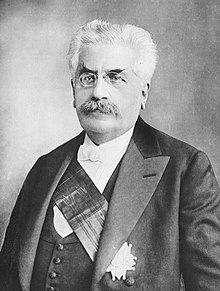
Back አሌክሳንድረ ሚየራን Amharic ألكسندر ميلران Arabic الكسندر ميلران ARZ Alexandre Millerand AST Aleksandr Milyeran Azerbaijani Аляксандр Мільеран Byelorussian Александър Милеран Bulgarian Alexandre Millerand Breton Alexandre Millerand Catalan Alexandre Millerand Czech
Alexandre Millerand | |
|---|---|
 Millerand in 1920 | |
| President of France | |
| In office 23 September 1920 – 11 June 1924 | |
| Prime Minister | Georges Leygues Aristide Briand Raymond Poincaré Frédéric François-Marsal |
| Preceded by | Paul Deschanel |
| Succeeded by | Gaston Doumergue |
| Prime Minister of France | |
| In office 20 January 1920 – 23 September 1920 | |
| President | Raymond Poincaré Paul Deschanel |
| Preceded by | Georges Clemenceau |
| Succeeded by | Georges Leygues |
| Minister of Foreign Affairs | |
| In office 20 January 1920 – 23 September 1920 | |
| Prime Minister | Himself |
| Preceded by | Georges Clemenceau |
| Succeeded by | Georges Leygues |
| Minister of War | |
| In office 26 August 1914 – 29 October 1915 | |
| Prime Minister | René Viviani |
| Preceded by | Adolphe Messimy |
| Succeeded by | Joseph Gallieni |
| In office 14 January 1912 – 12 January 1913 | |
| Prime Minister | Raymond Poincaré |
| Preceded by | Adolphe Messimy |
| Succeeded by | Albert Lebrun |
| Minister of Public Works, Posts and Telegraphs | |
| In office 24 July 1909 – 3 November 1910 | |
| Prime Minister | Aristide Briand |
| Preceded by | Louis Barthou |
| Succeeded by | Louis Puech |
| Minister of Commerce, Industry, Posts and Telegraphs | |
| In office 22 June 1899 – 7 June 1902 | |
| Prime Minister | Pierre Waldeck-Rousseau |
| Preceded by | Paul Delombre |
| Succeeded by | Georges Trouillot |
| Personal details | |
| Born | 10 February 1859 Paris, France |
| Died | 6 April 1943 (aged 84) Versailles, Occupied France |
| Political party | French Socialist Party (1902–1904) Republican-Socialist Party (1911–1912) Independent (1912–1940) |
| Spouse | |
| Children | Jean (1899–1972) Alice (1902–80) Jacques (1904–79) Marthe (1909–75) |
| Alma mater | University of Paris |
| Profession | Lawyer, journalist |
| Signature |  |
Alexandre Millerand (French: [alɛksɑ̃dʁ milʁɑ̃]; 10 February 1859 – 6 April 1943) was a French politician who served as President of France from 1920 to 1924, having previously served as Prime Minister of France earlier in 1920. His participation in Waldeck-Rousseau's cabinet at the start of the 20th century, alongside the Marquis de Galliffet, who had directed the repression of the 1871 Paris Commune, sparked a debate in the French Section of the Workers' International (SFIO) and in the Second International about the participation of socialists in bourgeois governments.
In 1912 Millerand was appointed as war minister in Poincaré's cabinet. He returned to the same post during the first year of World War I, helping set French war strategy. After Clemenceau's defeat in 1920, Millerand formed a cabinet and held both the premiership and the ministry of Foreign Affairs. In 1920-1924 he served as president of France. He faced criticism for openly supporting conservative candidates in the 1924 elections and the left majority forced his resignation. Thereafter he played only a minor role in politics. [1]
- ^ Bell pp 291-292.